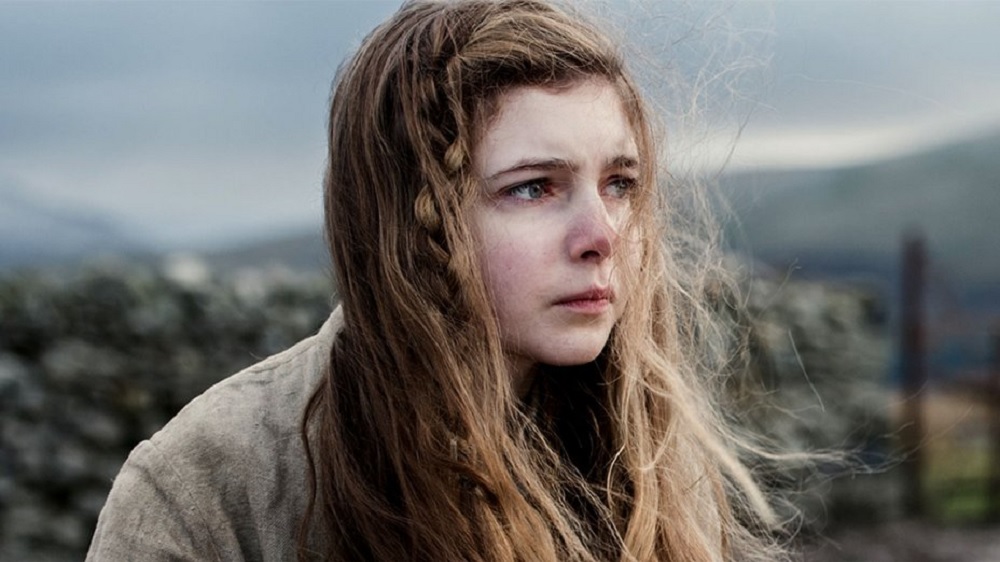Review: Gwen’s mud-filled horror gives us a slice of Welsh history on screen

Ben Gregory
Over the last week, I have been fortunate enough to attend three events which tells us a lot about the film industry in Wales.
Last Monday I sat in the audience in Cardiff in the annual get together of IntoFilm Cymru, the charity which carries out outstanding work with young people promoting all things cinematic in schools and beyond.
The main speaker was Lynwen Brennan from Tenby, IntoFilm Cymru’s newest Ambassador. Lynwen is the Executive Vice President of George Lucas’s family of companies (LucasFilm, Industrial Light and Magic etc). Which makes her probably the most powerful women in global cinema.
She told the children and young people there has never been a better time to think about a career in film. Production in Wales is booming, and there is a shortage of workers in all the trades which support film-making on an industrial scale.
At the end of the week Gwyl Arall in Caernarfon included a session with Jon Gower interviewing Karl Francis, the Bedwas film-maker, about his long and colourful career in film. The festival also screened his 2008 feature, Hope Eternal, a madly ambitious work in six languages filmed in five countries (four in Southern Africa and Wales), funded by S4C.
It’s not an easy watch, a tale in part of genocide and child-trafficking, and a Welsh doctor and a Madagascan nurse and her daughter caught up in the middle of events beyond their control. Though it is uneven in parts, the film sits easily in Karl Francis work over four decades, politically committed, telling big stories on small budgets.
His work includes multiple films about Wales and Northern Ireland, as well as productions abroad such as Hope Eternal and One of the Hollywood Ten. His first feature in 1977, Above Us the Earth, has been voted one of the best films ever produced in Wales.
With his longevity and breadth of work in film and TV, it’s not a stretch to see him in the same company as Ken Loach or the Dardenne brothers.
The third event was mid-week, in Pontio in Bangor. It was a preview of Gwen, a first feature by William McGregor.
Filmed in Snowdonia, the landscape is monumental, looming out of the November rain, snow and fog. It tells the story of a mother and two daughters, whose husband has gone to fight in the Crimea. Little by little they are forced off their land, part of the enclosure of Snowdonia for slate quarrying.
The film contains two strong performances, by young actor Eleanor Worthington-Cox, and Maxine Peake, who is never less than excellent. The men are reduced to little more than walk-on parts compared to these, including Richard Harrington.
Harrington was the male lead in Hope Eternal, but in Gwen, despite being on screen in many scenes, hardly utters a word.
Talent
There’s no doubt that McGregor, who hails from Norfolk, is a director to watch. He’s included in this month’s Sight and Sound review of the ‘new voices shaking up UK film’. Gwen is hard to categorise, a mix of costume drama and the supernatural.
If this month’s must-see Midsommar finds its horror in vibrant colours and Scandanavian sunshine, Gwen is all browns, its mud-filled horror coming from the extreme conditions that the family has to endure, and the economic forces that will crush them.
Gwen, like Hope Eternal, is well worth seeing, though it has its faults. The film, set in 1850s Snowdonia, is in English, with Welsh reduced to the margins. But that’s how mainstream cinema (even independent films) works.
To get the funding they have to have talent attached – and Maxine Peake is one of the best actors working in the UK at the moment. With backing even from the likes of FilmCymru and the BFI, there has to be hope of making at least some of the money back. It took McGregor and his producer eight years to find the money for the project.
It’s interesting to compare Gwen with two other historic productions I’ve recently caught up with on Netflix. Black 47 is set in the Irish famine, and in feel and look, at least for the first part, is similar to Gwen. The second, Rebellion, produced by RTE, told the story of the Easter Rising and its aftermath. Although it was not particularly well-received in the Republic, it is made on a scale hard to imagine in Wales.
This is nothing new. Paul Turner (who’s Hedd Wyn is another in the running for best ever Welsh film) tried and failed to make a biopic about Owain Glyndwr, It’s also been reported that Gareth Evans (of Raid fame) wants to make a biopic about Glyndwr as well.
Under present conditions though, it’s hard to see how the funding can come together for most films which seek to tell stories from Welsh history in either Welsh or English, especially on an epic scale. The challenge for most Welsh fim-makers is how to rustle up between £500,000 and £2 million to make any film which has ambitions to take place in more than several locations with a handful of actors.
Gwen goes on national release this week. The biography Encounters with….Karl Francis is also published this week.
Support our Nation today
For the price of a cup of coffee a month you can help us create an independent, not-for-profit, national news service for the people of Wales, by the people of Wales.






